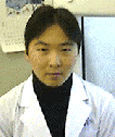
 ←HPicon
←HPicon

- KIMURA, Bon
- Professor
- Research
topics -
Development of a number of analytical methods to determine the microbial quality and safety of various foods.
Improvement of capacity to control food pathogens and food spoilage bacteria in foods. - keywords
- food safety, food microbiology, food preservation, molecular methods

- KUDA, Takashi
- Professor
- Research
topics -
Improvement of capacity to control food pathogens and food spoilage bacteria in foods.
Searching and applying useful microorganisms for food. - keywords
- food safety, food microbiology, fermented foods, intestinal microflora, food functions

- TAKAHASHI, Hajime
- Associate Professor
- Research
topics -
Development of a number of analytical methods to determine the microbial quality and safety of various foods.
Improvement of capacity to control food pathogens and food spoilage bacteria in foods. - keywords
- Food rheology, Solution properties, polysaccharides form seaweeds, fish-meat proteins
We are actively pursuing opportunities for collaboration with the food industry and we are developing researchers with the goal of conducting research that is directly linked to the needs of society. Please contact us with your interest in our research group.
Our current research methods and approaches are as follows
- 1. Rapid detection and typing of food-borne pathogens in food products using molecular techniques
- Routine microbiological tests for preventing contamination of food products with food-borne pathogens are essential for ensuring food safety. New developments based on recent advances in genome sequence data analysis for pathogenic bacteria are expected in the field of food microbiology.
In our Laboratory, we aim to apply genome analysis, as well as typing technologies that differ from conventional biochemical techniques, to develop rapid and accurate methods for detecting these harmful bacteria (food-borne pathogens and spoilage bacteria) found in food products. Developing technology that leads to a reduction in food waste by efficiently and accurately detecting harmful bacteria can indeed be considered a major goal for the 21st century. - 2.Elucidation of the physiological and molecular mechanisms of pathogen in food
- By elucidating the entire genomic sequence of bacteria, as well as their molecular mechanisms, we aim to clarify the expression and molecular mechanisms of deleterious genes and thereby ascertain the overall picture of cell function. We are currently investigating the expression mechanisms of botulinum toxin, histamine-producing enzymes, and enzymes associated with acid resistance in infectious toxic bacteria in food.
- 3.Development of technology for eliminating and controlling the growth of food poisoning bacteria in food products
- We are also developing sterilization and growth control methods for practical use in the food industry. Areas of research include heat sterilization methods effective against botulinum spores, as well as elimination and control of norovirus, Campylobacter, and EHEC in food factory , or fresh meat and produce.
- 4.Elucidation of the effects of diets on intestinal bacteria
- We are analyzing intestinal bacteria using next-generation DNA sequencing with the aim of detecting key microorganisms to diet and human health. We are also performing reserch on lactic acid bacteria having probioticactivities, such as immunity promotion, anti-infection andanti-inflammation, isolated from traditional fermented foods.



